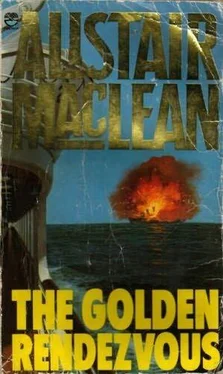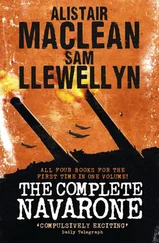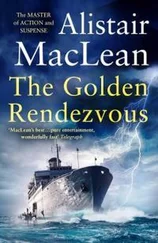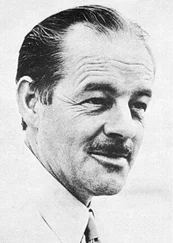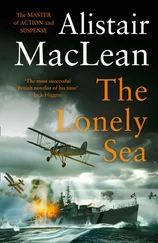Alistair MacLean
The Golden Rendezvous
[Tuesday Noon — 5 p.m.]
My shirt was no longer a shirt, but just a limp and sticky rag soaked with sweat. My feet ached from the fierce heat of the steel deck plates. My forehead, under the peaked white cap, ached from the ever-increasing constriction of the leather band that made scalping only a matter of time. My eyes ached from the steely glitter of reflected sunlight from metal, water, and whitewashed harbour buildings. And my throat ached, from pure thirst. I was acutely unhappy. I was unhappy. The crew was unhappy. The passengers were unhappy. Captain Bullen was unhappy and this last made me doubly unhappy, not because of any tenderness of feeling that, I entertained towards the captain, but because when things went wrong with Captain Bullen he invariably took it out of his Chief Officer. I was his Chief Officer. I was bending over the rail, listening to the creak of wire and wood and watching our after jumbo derrick take the strain as it lifted a particularly large crate from the quayside, when a hand touched my arm.
Captain Bullen again, I thought drearily; it had been at least half an hour since he’d been around last to talk to me about my shortcomings, and then I realised that, whatever the Captain’s caprices, wearing Chanel. No. He wasn’t one of them. This would be Miss Beresford. And it was. In addition to the Chanel, she was wearing a white silk dress and that quizzical, half-amused smile that made most of the other officers turn mental cartwheels and handsprings but served only to irritate me. I have my weaknesses, but tall, cool, sophisticated, and worldly young women with a slightly malicious sense of humour is not one of them.
“Good afternoon, Mr. First Officer,” she said sweetly. She had a soft, musical voice with hardly a hint of superiority or condescension when talking to the lower orders like myself, just enough to show that she had been to the best school and college in the east and I hadn’t. “We’ve been wondering where you were. You are not usually an absentee at aperitif time.”
“I know, Miss Beresford. I’m sorry.” What she said was true enough; what she didn’t know was that I turned up for aperitifs with the passengers more or less at the point of a gun. Standing company orders stated that it was as much a part of the ship’s officers’ duties to entertain the passengers as to sail the ship, and as Captain Bullen loathed all passengers with a fierce and total loathing, he saw to it that most of the entertaining fell to me. I nodded at the big crate now hovering over the hatchway of number four hold, then at the piled-up crates at the quayside. “I’m afraid I have work to do. Four or five hours at least. Can’t even manage lunch today, far less an aperitif.”
“Not Miss Beresford. Susan.” It was as if she had heard only my first few words. “How often do I have to ask you?”
Until we reach New York, I said to myself, and even then it will be no use. Aloud I said, smiling, “You mustn’t make things difficult for me. Regulations require that we treat all passengers with courtesy, consideration, and respect.” And self-respect made me resent the young and unmarried female passengers who regarded me as a source of idle amusement for their all too many idle hours; particularly was this true with rich young idle females — and it was common knowledge that Julius A. Beresford required the full-time services of a whole corps of accountants just to tot up his annual profits. “Especially with respect, Miss Beresford,” I finished.
“You’re hopeless.” She laughed. I was too tiny a pebble to cause even a ripple in her smiling pool of complacency. “And no lunch, you poor man. I thought you were looking pretty glum as I came along.” She glanced at the winch driver, then at the seamen manhandling the suspended crate into position on the floor of the hold. “Your men don’t seem too pleased at the prospect either. They are a morose looking lot.”
I eyed them briefly. They were a morose-looking lot. “Oh, they’ll be spelled for food all right. It’s just that they have their own private worries. It must be about a hundred and ten down in that hold there, and it’s an almost unwritten law that white crews should not work in the afternoons in the tropics. Besides, they’re all still brooding darkly over the losses they’ve suffered. Don’t forget that it’s less than seventy-two hours since they had that brush with the customs down in Jamaica.”
Brush, I thought, was good: in what might very accurately be described as one fell swoop the customs had confiscated from about forty crew members no fewer than twenty-five thousand cigarettes and over two hundred bottles of hard liquor that should have been placed on the ship’s bond before arrival in Jamaican waters. That the liquor had not been placed in bond was understandable enough as the crew were expressly forbidden to have any in their quarters in the first place; that not even the cigarettes had been placed in bond had been due to the crew’s intention of following their customary practice of smuggling both liquor and tobacco ashore and disposing of them at a handsome profit to Jamaicans more than willing to pay a high price for the luxury of duty-free Kentucky bourbon and American cigarettes. But then, the crew had not been to know that, for the first time in its five years’ service on the West Indian run, the S.S. Campari was to be searched from stem to stern with a thorough ruthlessness that spared nothing that came in its path, a high and searching wind that swept the ship clean as a whistle. It had been a black day. And so was this. Even as Miss Beresford was patting me consolingly on the arm and murmuring a few farewell words of sympathy which didn’t go any too well with the twinkle in her eyes, I caught sight of Captain Bullen perched on top of the companionway leading down from the main deck.
“Glowering” would probably be the most apt term to describe the expression on his face. As he came down the companionway and passed Miss Beresford he made a heroic effort to twist his features into the semblance of a smile and managed to hold it for all of two seconds until he had passed her by, then got back to his glowering again. For a man who is dressed in gleaming whites from top to toe to give the impression of a black approaching thundercloud is no small feat, but Captain Bullen managed it without any trouble. He was a big man, six feet two and very heavily built, with sandy hair and eyebrows, a smooth red face that no amount of sun could ever tan, and a clear blue eye that- no amount of whisky could ever dim. He looked at the quayside, the hold, and then at me, all with the same impartial disfavour. “Well, Mister,” he said heavily. “How’s it going? Miss Beresford giving you a hand, eh?” When he was in a bad mood, it was invariably “Mister”; in a neutral mood, it was “First”; and when in a good temper — which, to be fair, was most of the time it was always “Johnny-me-boy.” But today it was “Mister.”
I took my guard accordingly and ignored the implied reproof of time-wasting. He would be gruffly apologetic the next day. He always was. “Not too bad, sir. Bit slow on the dockside.” I nodded to where a group of men, some bearded, all wearing denim trousers and vaguely military-looking shirts, were struggling to attach chain slings to a crate that must have been at least eighteen feet in length by six square. “I don’t think the Carracio stevedores are accustomed to handling such heavy lifts.”
He took a good look. “They couldn’t handle a damned wheelbarrow,” he snapped eventually. “Never seen such fumble-handed incompetence in my blasted life. First time in this stinking flea-ridden hellhole — Carracio was actually one of the cleanest and most picturesquely beautiful ports in the Caribbean and I hope to heaven it’s the last. Can you manage it by six, Mister?”
Читать дальше
Конец ознакомительного отрывка
Купить книгу
